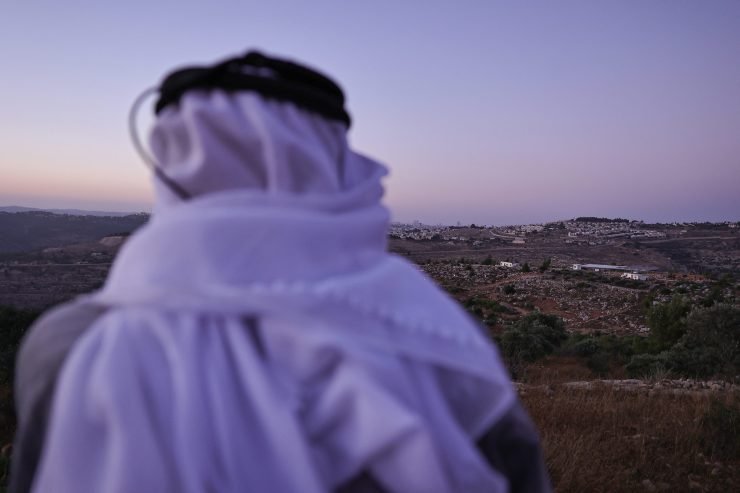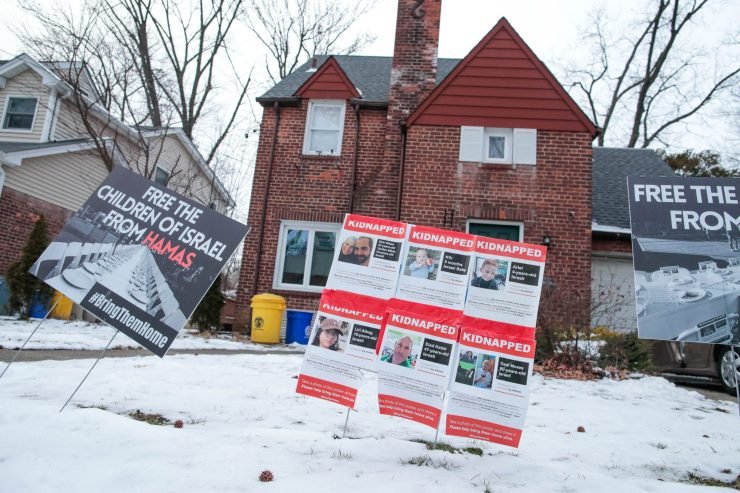Amid an escalation of violence and protests in the West Bank, there is increasing scrutiny of the flow of money and other resources from the U.S. Jewish community to support the expansion of Israeli settlements in the Palestinian territories. According to settlement tracking group Peace Now, the Israeli government has seized more Palestinian land in the West Bank this year than any time in the last three decades.
Throughout the spring and summer, there have been raucous protests and counterprotests outside some synagogues in Brooklyn and Queens, New York City; Englewood and Teaneck, New Jersey; Los Angeles; Montreal and Toronto.
The synagogues are being criticized — and picketed — for hosting real estate fairs that tout property for sale in Israel and the Palestinian territories to North American Jews.
On Sunday, March 10, a tense scene unfolded at Congregation Keter Torah, an Orthodox synagogue in Teaneck — a suburb of Manhattan with a large Jewish population.
Outside the synagogue, behind police barricades, hundreds of pro-Palestinian activists chanted protest slogans, including “One, two, three, four. Occupation no more!” “Say it loud and say it clear: We don’t want no Zionists here!” and “We don’t want no Jewish state. We want ‘48!”
The protesters were there to call out and condemn what was happening inside the synagogue: an Israeli property fair. Photos show visitors at the event browsing glossy real estate displays that pitched houses and condos in Israeli cities like Tel Aviv and Haifa as well as settlements such as Efrat and Ma’ale Adumim in the occupied West Bank.
Representatives of Congregation Keter Torah and the organizer of the real estate fair there, My Home in Israel, did not respond to requests for comment from Marketplace.
Baruki Cohen runs the real estate firm Israel Home, which sells property in Israel and the Palestinian territories. He didn’t participate in the fair in Teaneck, but he’s familiar with these marketing events targeted to religious Jews in America.
“You’ll have apartments on the ocean in Tel Aviv that could go for $20 million,” Cohen said. “Small homes that could go for $300,000 to $400,000.”
Israel subsidizes settlements in the West Bank, making property there cheaper.
But selling that real estate is problematic under international law. Bill Van Esveld at Human Rights Watch said that the Geneva Conventions, the International Court of Justice, the U.S. and most other governments agree: “It’s not Israeli territory. It’s Palestinian. International law is actually quite simple. It’s really a bright-line rule: There’s no appropriation and transfer of property for settlements in occupied territory. It’s not allowed.”
And so, noted Brian Finucane, a former State Department official now at the International Crisis Group who recently wrote about the issue: “The U.S. should be taking steps to encourage U.S. persons not to engage in settlement activity in the West Bank.”
Finucane added that, practically speaking, the U.S. may not be able to deter individual purchases of occupied land by Americans.
“The ability of the U.S. government to target or push back against these real estate sales in the United States, that may be limited,” he said. “But the U.S. has a lot of policy tools to tackle the settlement project writ large.”

On the contrary, said Eugene Kontorovich, head of the Center for the Middle East and International Law at George Mason University, the U.S. government shouldn’t be involved in Americans’ property transactions in the West Bank — at all.
“The United States has simply never said that there is any legal obstacle to American citizens either buying or selling properties in these locations,” Kontorovich said. “There’s absolutely no rule that would prohibit an American citizen from buying a house anywhere — in a place on which there’s not sanctions, maybe like Russia or North Korea. I think it’s a made-up issue which has been used to justify acts of violence and vigilantism outside synagogues.”
Other critics of the synagogue protesters, including local rabbinical organizations and the Anti-Defamation League, have raised concerns about antisemitism and intimidation.
Teaneck Councilwoman Hillary Goldberg condemned the protesters in a series of speeches and Instagram posts. “I was grateful that as I stood with our amazing police officers all day for six hours at Keter Torah, that I did not recognize a single face in that crowd. Those were not our neighbors. On that day, we heard outside agitators protesting our land, protesting our right to have a homeland, a homeland that we know is critical for our survival.”
The groups organizing the protests reject those charges. Activists with the anti-Zionist Jewish Voice for Peace, which includes Jewish residents of Teaneck, have helped organize protests at real estate fairs in New York and New Jersey this year.
Rabbi Abby Stein is a member of Jewish Voice for Peace’s rabbinical council, which recently endorsed the protests at synagogues. “They’re selling land that — by international law and even U.S. law — Israel has no right to sell,” said Stein. “They do it at the synagogue, and then everyone who protests, they focus on, ‘Oh, how dare you protest at a synagogue.’ It’s not just that there’s nothing wrong with it. There’s a long tradition of protesting at synagogue.”
In published reports, some organizers have said their synagogue real estate fairs are open to non-Jews.
Arab-American civil rights groups, meanwhile, including the Council on American-Islamic Relations, or CAIR, have called on federal and state officials to investigate potential violations of anti-discrimination and fair-housing laws.
CAIR-NJ chapter Executive Director Selaedin Maksut said questions remain about the real estate services on offer.
“Are Palestinians freely able to access and purchase land and participate in the business transaction?” he asked. “If there is discrimination here, denial of services based on ethnicity or national origin, then there might be a case to investigate.”
A spokesperson for the New Jersey attorney general’s office provided the following statement to Marketplace: “The New Jersey Division on Civil Rights (DCR) is committed to protecting our residents from housing discrimination. The New Jersey Law Against Discrimination generally prohibits entities from discriminating on the basis of race, religion, national origin, ancestry, and other protected characteristics in housing. However, DCR does not comment on potential or pending enforcement matters.”

Palestinian human rights lawyer Diana Buttu, a dual Canadian-Israeli citizen who lives in Haifa, cites the Israeli Law of Return, which allows Jews anywhere in the world to move to Israel, along with restrictions on Arab residents’ housing rights through the Admissions Committees Law, to question whether these events truly welcome all participants.
“If you are Jewish, you can not only acquire citizenship, but you can also buy in the settlements,” said Buttu. “Whereas if you are Palestinian, you cannot acquire citizenship, and you certainly cannot buy.”
That doesn’t bother Baruki Cohen, the American-Israeli real estate promoter, who spoke from his home in Jerusalem near the Western Wall. “I don’t have any problem selling property in East Jerusalem or in the West Bank,” he said. “I don’t view them as occupied. Those lands were won in a defensive war.”
More Israel real estate fairs are planned in New York, New Jersey and Maryland this fall.
Additional research by Elissa Castles.
There’s a lot happening in the world. Through it all, Marketplace is here for you.
You rely on Marketplace to break down the world’s events and tell you how it affects you in a fact-based, approachable way. We rely on your financial support to keep making that possible.
Your donation today powers the independent journalism that you rely on. For just $5/month, you can help sustain Marketplace so we can keep reporting on the things that matter to you.


